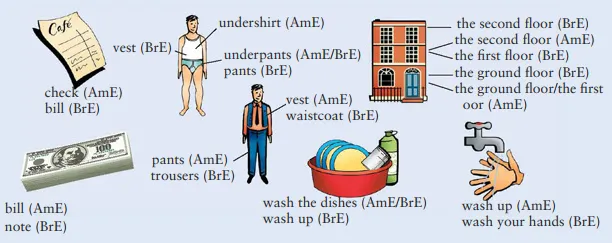A. English in the USA
English in the USA differs from British English. Pronunciation is the most striking difference but there are also differences in vocabulary and spelling as well as some differences in grammar. Americans say the fall, while British English speakers say autumn; American speakers say on the weekend; British English prefers at the weekend. Yet, generally, British and American speakers have little difficulty in understanding each other.
B. American English spelling
American English spelling is usually simpler. For example, British English words ending in -our and -re end in -or and -er in American English, e.g. colour/color, centre/center. Many verbs ending in -ise in British English end in -ize in US English (realise/realize). There are differences in individual words too, e.g. British jewellery is jewelry in American English.
C. US words and their British equivalents
* baggage is also common in British English, especially in the context of air travel
** wash room is commonly used in Canada
Language help
American and British pronunciations are often different. You can hear the British and American pronunciation of words on the Cambridge Advanced Learner’s Dictionary at Cambridge Dictionaries Online.
D. Different meanings
Here are some words and phrases which could cause confusion when used by Brits and Americans talking together because they mean something different in each ‘language’.

|


Bình luận